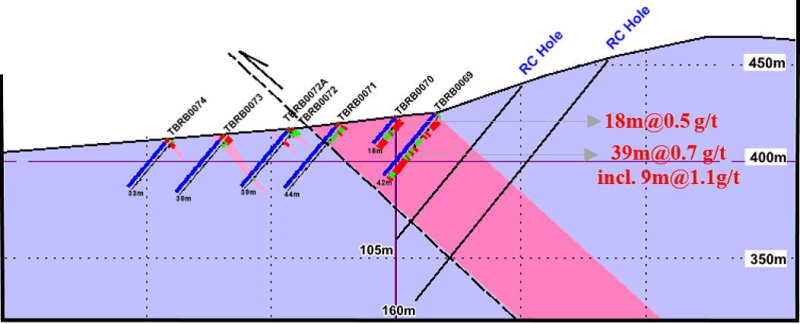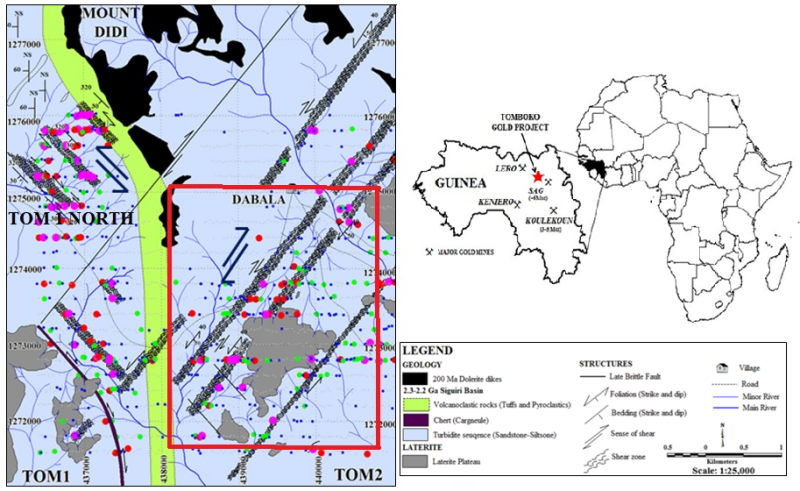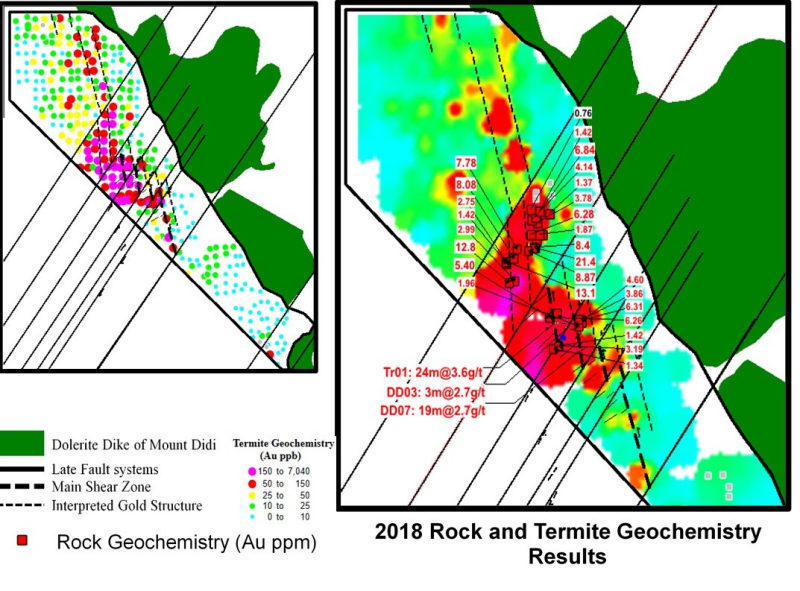Nortec Minerals completes and files NI 43-101 Technical Report, Tomboko Gold Property, Northeast Guinea, West Africa
(TheNewswire)
Vancouver, BC / The Newswire / November 1, 2018 – NORTEC MINERALS CORP. (the “Company” or “Nortec”) (TSXV: NVT):
Nortec announces the completion of the NI 43-101 compliant Technical Report on the Tomboko Permit, Northeastern Guinea, West Africa. Dr. Serigne Dieng, Ph.D., AuSIMM is the author of the Technical Report. Dr. Dieng is a registered professional geoscientist in accordance with NI 43-101 and JORC standards. Dr. Dieng received his Ph.D. in Structural Geology, Exploration Geochemistry and Ore Deposit Genesis from Queens University, Kingston, Ontario. The Report will be filed on SEDAR and posted on the Company’s website, www.nortecminerals.com.
Dr. Dieng reviewed and compiled all the data received to date from the diamond core, RAB and trench sampling. He also completed detailed sampling of the outcrops along potential trends of the mineralized zones. He is well-versed with the Tomboko, Kouroussa and Badamako projects having worked on the permits from January 2012 to October 2014.
The Technical Report’s conclusions and recommendations are as follows.
Conclusions
The Tomboko Gold Project consists of an exploration license covering a surface area of 75.45 km² in the Siguiri Basin, North-eastern Guinea – West Africa and is valid for the next three years.
Successive exploration works completed by Wega Mining, The Golden Rule and Nortec was professionally managed and procedures were consistent with generally accepted industry best practices. The exploration data from termite mounds, soil and rock geochemistry sampling and drilling are sufficiently reliable to confidently allow interpretation of the gold mineralization at TOM-1 North deposit and in TOM-2 and, planning of an extensive drilling program over existing gold anomalies in areas that have not been drill-tested in order to add additional gold mineralization that can lead to resource estimations and delineation.
Early termite mounds, soil and rock geochemistry reconnaissance and follow-up surveys and first pass geological field mapping completed by Wega between 2007 and 2009 resulted in the identification of three anomalous zones of gold mineralization namely TOM-1, TOM-2 and TOM-3 Targets.
Additional geological and structural field mapping and rock chip sampling over TOM-1 and TOM-2 Targets by The Golden Rule in 2012 (Dieng, 2012) determined the geological and structural setting of the area, established a conceptual structural model for the gold mineralization and identified a series of brittle-ductile shear zones that have a strong spatial correlation with the gold mineralization at surface. The NW-striking sinistral brittle-ductile fracture systems in TOM-1 and the NE-striking dextral brittle-ductile fault systems in TOM-2 control the gold mineralization in the Tomboko Prospect and are identical to structures that host the nearby Siguiri Gold Mine (Figure 1.1 in the Technical Report).
Nortec undertook a first pass Diamond and RAB drill programs on these three Prospects in September 2017. At TOM-1 North Target gold mineralization were intercepted (24m@3.7g/t (including 4m@10.1g/t) and 19m@2.7g/t) over the NW-striking sinistral brittle-ductile fracture systems. At TOM-2, RAB drilling over the NE-striking brittle-ductile dextral strike-slip fault systems intercepted 39m@0.7g/t (including 9m@1.1g/t) and 18m@0.5g/t.
Detail structural logging on the TOM-1 drill cores in June 2018 demonstrated that the TOM-1 North gold deposit is hosted in faulted and sheared contact between volcano-clastic successions of lapilli and ash tuffs and suggested that the gold mineralization is structurally-controlled and occurs in deformed zones of large and highly hydrothermally altered, NNW-striking, ENE-steeply-dipping, structural corridors that contain a complex network of extensional dilation fracture systems. New high grade gold mineralization from outcrops and termite mounds survey show a possible northern extension of the deposit over 1.5 km.
The Tomboko Gold Project is part to the Paleoproterozoic rocks of the Siguiri Basin, in the Birimian Super group of West Africa that host several multi-million-ounce gold deposits in operation (SAG at Siguiri operated by AngloGold -Ashanti and Lero at Lefa operated by Nordgold), one smaller gold mine at Kéniéro. Geological and structural relationships, petrographic and alteration assemblage demonstrate that the Tomboko gold deposit is a Mesothermal shear-zone-controlled, Orogenic-type gold mineralization, hosted in greenstone folded and faulted volcanoclastic successions. The structural evolution of the deposit as well as the gold mineralization style is identical to the nearby +8 Moz SAG Gold Deposit operated by AngloGold-Ashanti. The Tomboko Property can therefore, be considered as very prospective terrane to host an economic gold deposit considering that aggressive exploration works including extensive drilling program will continue to further define and delineate additional gold mineralization.
The following recommendations for additional exploration works on the Tomboko Property are proposed. Different drilling phase programs are recommended to advance each of the Targets within the Tomboko Property. The budget is estimated for each drilling phase and is for the proposed field costs, administrative costs, logistics and contractors, but do not include any capital expenditures or corporate management.
TOM-1 North Target
The proposed Phases I to III drill programs will be confined to Reverse Circulation drilling (RC) to test and expand the actual TOM-1 North deposit and the immediate northern extension. The Phase I will test the interpreted structural model of the deposit while the Phases II and III are based on the positive termite mounds and rock geochemistry results that define new targets north of the actual deposit. A RAB drill program is recommended for the phase IV to test others surface termite mounds gold anomalies within the TOM-1 North zone in order to identify additional targets with potential mineralization for resource expansion and discovery of new zones of mineralization. The Phase I to IV program maps and sections and budgets recommended are shown in Figures 27.1 to 27.7 and in Tables 1.1 and 1.2 and are based on the following objectives (The Figures can be referred to in the Technical Report).
Phase I RC Drilling Program Objectives (Budget US$ 555,000)
The detailed structural and geological logging and structural interpretation and modelling on the diamond drill-tested TOM-1 North deposit undertaken by Nortec in June 2018 resulted in a coherent and comprehensible new geological and structural model that gives a better understanding of the structural setting and the style of the gold mineralization and re-orient further drilling programs. The Phase I RC drilling program objectives are therefore, to:
Test the proposed geological and structural model of the gold deposit (Figure 1.2)
Test a strike length of 600 meters over the interpreted mineralized structure
define and delineate laterally and down dip the gold deposit within the interpreted structure
12 fences spacing 50 meters apart
2 RC holes for each fence totalizing 3,600 meters. Holes are oriented north-east, inclined 50o and depth varying between 175 to 80 meters
Important Note. Access is very difficult on the hanging-wall site of the gold structure (slope is steep and presence of blocks of dolerite) justifying holes oriented eastward instead of westward.
Phase II RC Drilling Program Objectives (Budget US$ 500,000)
The Phase II RC drilling program is not dependent on the outcome from Phase I program and is intended to test new targets immediately north of the actual deposit that were discovered during the 2018 exploration works with high gold grade in rock chips and in termite mounds. The new discovered target extends over 1.5 km north of the actual deposit. The key exploration objectives to be addressed include:
-
Test the most favourable termite mounds and rock geochemistry targets north of the actual deposit
Test a strike length of 1 km over high gold grade in termite mounds and rock chips
9 fences spacing 100 meters apart on a drilling grid of 100x50 meters
3 to 4 RC holes of 100 meters deep for each fence totalizing 3,000 meters.
Phase III RC Drilling Program Objectives (Budget US$ 500,000)
The Phase III program is dependent on the outcome from the Phase II program and will be implemented only if results of Phase II are positives. The key exploration objectives of this program include:
-
RC infill drilling program to convert inferred resources into indicated resources
Test a strike length of 1 km after interpretation of the northern extension of the structure in Phase I
9 fences spacing 100 meters apart
3 to 4 RC holes of 100 meters for each fence totalizing 3,000 meters.
Phase IV RAB Drilling Program Objectives (Budget US$ 275,000)
The Phase IV RAB drilling program in TOM-1 North Target is intended to test the northern termite mounds and soil geochemistry anomalies discovered during the 2018 infill geochemistry sampling.
The main objective is to develop a new Target zone which may warrant further drilling program.
The proposed drill program will be confined to RAB drilling to test the most favorable termite mounds anomaly. The author recommends 5 fences spacing 200 to 300 meters apart. 5 to 6 RAB holes of 30 to 40 meters deep for each fence totalizing 1,000 meters.
TOM-2 Target
The recommended drilling program on the TOM-2 Target aims to test the northern extension of the mineralization intercepted in Line 1,000 N (39m@0.7g/t from 3m including 9m@1.1g/t and 18m@0.5g/t) (Figure 1.3) and numerous others clusters of termite mounds geochemistry anomalies containing high gold grade that have not been drill-tested. The objective will be to develop new drill target zones within the TOM-2 Prospect that can justify further extensive RC drilling programs and add more resources.
The proposed RAB drill program aims to better define the extension north of the mineralization in Line 1,000 N and to test the most favorable termite mounds anomaly containing high gold grade.
The writer recommends 9 fences spacing 200 to 300 meters apart. 6 to 20 RAB holes of 30 to 40 meters deep for each fence totalizing 3000 meters.
Two (2) RC holes are recommended to explore the down-deep extension of the gold mineralization intercepted in Line 1,000N (Figure 1.3 in the Technical Report, see below)
TOM-3 Target
The recommended drilling program on the TOM-3 Target tests numerous clusters of termite mounds geochemistry anomalies containing high gold grade at or near the contact between interpreted intrusive rock and the sediments. These anomalies have not been drill-tested in the previous drilling program. The objective will be to develop new drill target zones within the TOM-3 Prospect that can add more resources.
The author proposes 5 fences spacing 200 to 300 meters apart. 4 to 10 RAB holes of 30 to 40 meters deep for each fence totalizing 1,000 meters.
The recommended detailed budgets for RC drilling and RAB drilling programs can be referred to in the Technical Report.
Tomboko Property Description and Ownership
The Tomboko Gold Project is located in the North-eastern area of the Republic of Guinea, and is within the administrative region of Kankan and the Prefecture of Siguiri and immediately west of the Siguiri Gold Mine operated by AngloGold-Ashanti (Figures below). The Tomboko Gold Project is owned 100% by Alamako Corporation International SARL (ACI). The Golden Rule Mining Inc has entered into an agreement to own 100% of ACI’s Equity in the Tomboko Gold Project. Nortec earned a 51% interest of Tomboko by completing Phases 1 and 2 of the Definitive Option Agreement (Agreement) entered with The Golden Rule Mining Inc. in 2017. Nortec also spent approximately US$ 1 million of the required US$ 2.5 million to earn the remaining 29%. This will convert to pro-rata interest as defined in the Agreement. The Tomboko Permit is in good standing as of the effective date of the Technical Report.
Mohan R. Vulimiri, M.Sc., P.Geo, Director of Nortec and CEO of Nortec Minerals, is a Qualified Person as defined by NI 43-101. Mr. Vulimiri has approved the corporate and technical content contained in this press release.
Other News:
The Company announces the resignation of Michael Collins from the Nortec’s Board of Directors. We, the Management and Board, express our sincere gratitude to Mike for his contributions.
About Nortec Minerals Corp.
Nortec is a mineral exploration and development company based in Vancouver, British Columbia. The Company has a 49% interest in the Tammela Gold & Lithium Project in South-West Finland. Sunstone Metals (formerly Avalon Minerals), a public Australian mining company has earned the 51% interest and is carrying out the 29% Stage 2 earn-in interest on the Tammela Project. Avalon has completed more than 3,000 meters diamond drilling on the Kietyonmaki lithium prospect and the Satulinmaki and Riukka prospects that comprise the Tammela Project. Detailed information on the Company’s projects have been posted on the Company’s website www.nortecminerals.com.
-------------------------------------- |On behalf of the Board of Directors,| | | |NORTEC MINERALS CORP. | | | |“Mohan R. Vulimiri” | |Mohan R. Vulimiri, CEO and Chairman | --------------------------------------The TSX Venture Exchange has not reviewed and does not accept the responsibility for the adequacy or accuracy of this news release.
This press release contains certain forward looking statements which involve known and unknown risks, delays and uncertainties not under the Company’s control which may cause actual results, performances or achievements of the Company to be materially different from the results, performances or expectations implied by these forward looking statements. This news release does not constitute an offer to sell or a solicitation of an offer to buy any of the securities in the United States.
Location map, TOM 1 North and TOM 2 South Targets, Tomboko Exploration Project, Guinea
Tom1 North outcrop rock sampling, trench, drilling results and termite mound geochemical survey anomalies.
1000N Cross Section and Plan View Map, TOM 2 South Target
Copyright (c) 2018 TheNewswire - All rights reserved.




